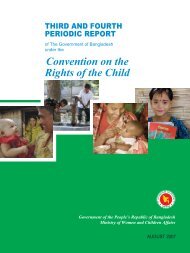Government-funded programmes and services for vulnerable - Unicef
Government-funded programmes and services for vulnerable - Unicef
Government-funded programmes and services for vulnerable - Unicef
Create successful ePaper yourself
Turn your PDF publications into a flip-book with our unique Google optimized e-Paper software.
<strong>Government</strong>-<strong>funded</strong> <strong>programmes</strong> <strong>and</strong> <strong>services</strong> <strong>for</strong> <strong>vulnerable</strong> children in SA<br />
➔<br />
Programmes/<strong>services</strong> <strong>for</strong> children in conflict with the law<br />
The criminal<br />
capacity of<br />
children aged<br />
between<br />
10 <strong>and</strong> 14<br />
must be<br />
determined<br />
by the<br />
presiding<br />
officer,<br />
based on a<br />
probation<br />
officer’s<br />
assessment<br />
Once a child between<br />
the ages of 10 <strong>and</strong> 14<br />
has been arrested <strong>and</strong><br />
referred to a probation<br />
officer by a police<br />
official, the probation<br />
officer must make<br />
an assessment of the<br />
criminal capacity of<br />
the child <strong>and</strong> make<br />
recommendations to<br />
the court regarding<br />
the child’s criminal<br />
capacity. x<br />
The presiding officer<br />
of the child justice<br />
court must make a<br />
ruling on the child’s<br />
criminal capacity,<br />
having regard to the<br />
probation officer’s<br />
report.<br />
Targeted beneficiaries<br />
Children between the<br />
ages of 10 <strong>and</strong> 14<br />
who have committed<br />
a crime <strong>and</strong> who lack<br />
criminal capacity (based<br />
on an assessment<br />
of factors such as<br />
their educational<br />
level, their cognitive<br />
ability, their domestic<br />
<strong>and</strong> environmental<br />
circumstances, their age<br />
<strong>and</strong> maturity)<br />
The presiding officer is<br />
the inquiry magistrate<br />
or judicial officer<br />
presiding at the child<br />
justice court.<br />
A ‘child justice court’<br />
means any court<br />
dealing with a bail<br />
application, plea, trial<br />
or sentencing of a<br />
child.<br />
The child justice court<br />
is not a separate court.<br />
It is any court that<br />
deals with a child<br />
accused of committing<br />
a crime <strong>and</strong> which<br />
applies the Child<br />
Justice Act to the case<br />
at h<strong>and</strong> (Gallinetti<br />
2009).<br />
The child<br />
may be<br />
diverted<br />
by the<br />
prosecutor<br />
or the<br />
magistrate<br />
be<strong>for</strong>e the<br />
trial, or<br />
during the<br />
trial in the<br />
child justice<br />
court<br />
‘One of the main<br />
principles of the Act is<br />
to minimise children’s<br />
contact with the<br />
criminal justice system,<br />
<strong>and</strong> to use detention<br />
only as a measure of<br />
last resort <strong>and</strong> <strong>for</strong> the<br />
shortest appropriate<br />
period of time.’ xi<br />
Diversion is a key<br />
intervention provided<br />
<strong>for</strong> by the Act to<br />
realise this objective.<br />
Diversion involves<br />
‘the referral of cases<br />
away from the<br />
<strong>for</strong>mal criminal court<br />
procedures’ (Gallinetti<br />
2009: 66).<br />
Targeted beneficiaries<br />
Children aged 10–18<br />
accused of committing<br />
a crime<br />
The prosecutor or the<br />
magistrate presiding<br />
over a preliminary<br />
inquiry or the<br />
presiding officer of the<br />
child justice court<br />
➔<br />
232
















